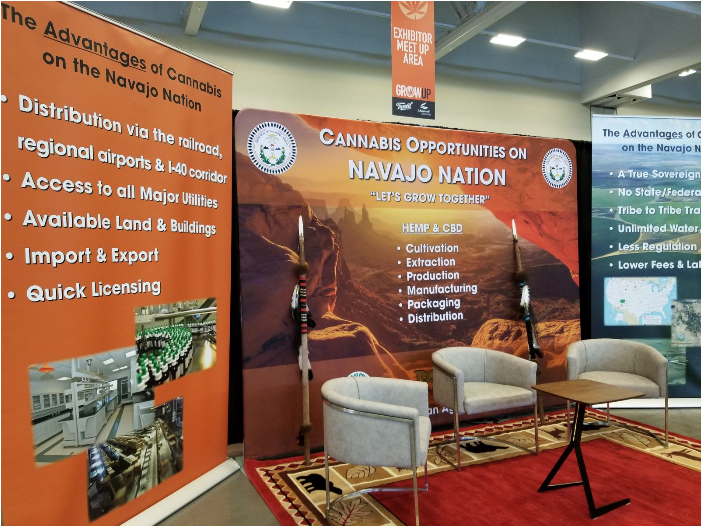
Niagara Falls is such an apt location for cannabis in Canada to grow up. From Toronto you take the Queen Elizabeth Way (the QEW) all the way around Lake Ontario, bypassing Hamilton on the inside lane until you turn off onto the 420.
Then you’re looking down into vast volumes of water throwing itself over a cliff and an entire town given over to what it thinks people on the other side of that water want. Casinos, and breakfast buffets, and no parking anywhere. But lots of valets.
There’s a young man talking up his $99 cannabis bus tours on the sidewalk outside the conference centre hosting the ‘Grow Up! Cannabis Convention and Expo’ that took place September 7–8.
He’s offering birthdays, bachelor parties, corporate nights, whatever.
He’s gotten lots of interest, he says, but he can’t run them yet. Not unless every passenger has a medical card. He’s working with a clinic to provide prescriptions when deemed medically appropriate, but not everyone in his target audience is going to want to put their cannabis consumption on their health record.
So he’s waiting and positioning himself, as is everyone inside that conference centre, for what comes next.
And what comes next is big, and still rather unknown.
The new federal law (the Cannabis Act) coming into effect on October 17 will make Canada the first G7 country to make cannabis legal but also establish strict rules on its production, distribution, sale and use.
An industry that has always existed on the sidelines is about to burst forth into the mainstream and a lot of people that have a history with the plant want to know if they will have a place in the new system.
Many of those attending the weekend conference were there to pitch their wares and to close deals. On the expo floor one equipment maker was selling complete industrial weighing, capping and labelling systems for $250,000, while a string of others were pitching everything from security systems, lighting, soil nutrition, testing and lab services, and all manner of other ancillary services.

The Navajo Nation was inviting larger-scale growers to their tax haven with limited red tape and inter-tribe transportation across the United States, for just a 50–50 stake in whatever they grow.
There was also a spot for budding home horticulturists — men in suits and some more casually dressed with longer hair, a couple of suburban stoners, one woman — seeking tips as they plan to take advantage of the four plant allowance written into the new law. Grow in a space that can be sanitized to reduce the likelihood of mildew, one presenter advised. Use cheap hardware store buckets to make your own oxygen pot system, recommended another.
Canada is less than six weeks out from legal cannabis for all (as long as it’s in flower or oil form) and there is a lot of work still to be done.
And some of that work was happening here at Grow Up, which hosted a separate one-day track for those focusing specifically on the junction between cannabis and healthcare, providing doctors, pharmacists and other healthcare professionals with sessions on cannabis’ potential as an opioid alternative, appropriate dosing and delivery methods, the body’s endocannabinoid system, and more.
In April last year, Health Canada had 130 employees working on cannabis-related issues, now there are around 400, said Benoît Séguin from the department’s cannabis office. He didn’t say how many more are expected to be added once the legal industry kicks into gear.
There are no rules yet to govern edibles or topicals, and there will not be until much closer to one year post-Zero Day, Séguin confirmed in a panel on the regulatory maze and how it might be navigated.
And even for dried flower and oil products the federal law’s rollout will be inconsistent at launch. Some provinces out east are rushing ahead with production, retail and even possible farmyard sale plans, while British Columbia only last month sought retail license applications and several of its cities have sought to vary their local terms.
Ontario is all up in the air since the newly-elected Doug Ford government nixed the LCBO-linked public retail store monopoly of its predecessor (but kept an online portal) in favour of private brick-and-mortar stores that won’t be set up until next year. But at least that online store is unlikely to run out of supply, having signed up 32 licensed producers so far.
And then there are the municipal rules, which may contradict or otherwise not align with provincial or federal ones. Expect constitutional challenges on a range of fronts as the rubber hits the road, said lawyer Sarah Leamon, adding that amnesty for those with non-violent cannabis-related convictions is not at the forefront of Ottawa’s agenda. Anyone considering a move into cannabis is well advised by consultant Ivan Ross Vrána that going through the hard slog with paperwork early will prove valuable.

There are more consultations to be held in coming months, and then formulations to be calculated and recommendations to be issued and applications to be submitted.
Séguin did try to clarify something about the marketing that can be used to sell specific cannabis products, amid concern from the industry that plain packaging would stifle efforts to educate consumers and sell them the most appropriate products.
If you want to make specific claims about a strain or a product then “you need to bring the data forward,” he added. “Let’s just stand within the rules and things will go perfectly and you won’t hear from me.”
Let’s see how that goes.
A panel titled ‘Brand-Aid’ considered this topic in detail, with panellists broadly in agreement that companies need to build trust with their audience by providing relevant information, expertise and industry knowledge.
Robyn Rabinovitch, head of business strategy at TerrAscend, said that education benefits everyone in the industry as it helps grow the overall pie and that education can also include explaining how your brand is different from others.
She gave kudos to those taking risks, and advised being nimble and willing to pivot, developing a strategy able to change as quickly as the industry will.
“Don’t let the regulations scare you too much,” said author and publisher Andy Buyting, suggesting it is better to beg for forgiveness than ask for permission.
RNMKR CEO Corey Herscu added that there was “nothing more important than finding your company’s X factor” and to avoid trying to be everything to everyone. When you stop chasing customers people will come to you, he said.
Kevin O’Leary was also there, but I missed him. Oh well.
I did meet a scientist who had co-authored a paper in the 70s recommending to PM (Pierre) Trudeau that he legalize cannabis who had a good laugh about how long it took for the government to take him up on his advice.

And I ran into the Guru of Ganja before I knew who Ed Rosenthal was, and watched as attendees came over in waves to chat and get their photograph taken with him. Watching him smoke a joint with another master grower made it clear that cannabis was in a place it would be celebrated.
MobileSyrup may earn a commission from purchases made via our links, which helps fund the journalism we provide free on our website. These links do not influence our editorial content. Support us here.


